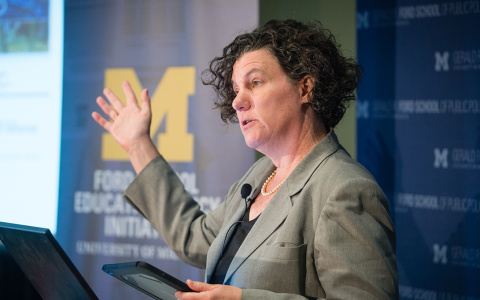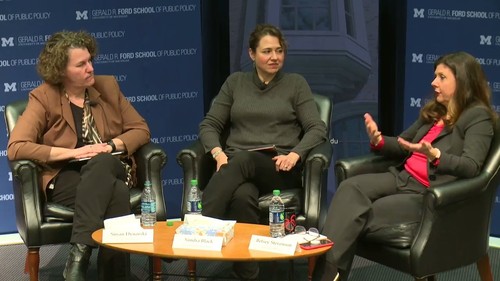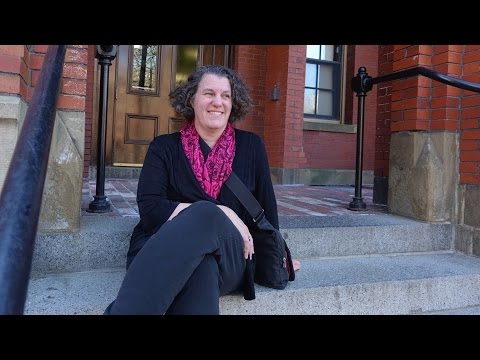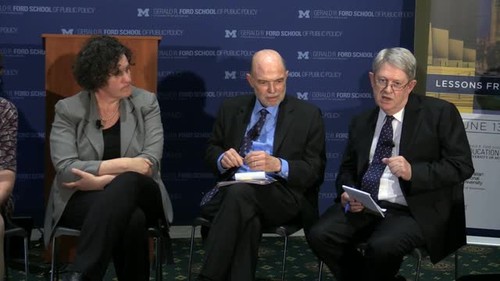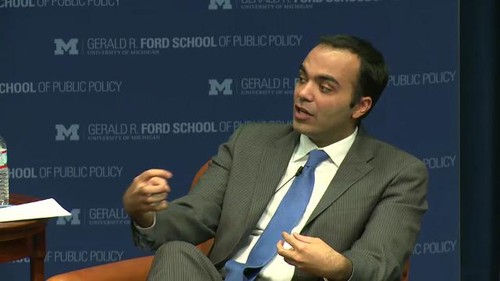Susan M. Dynarski
Susan M. Dynarski is a professor at Harvard University, where she holds an appointment at the Graduate School of Education.
She recently moved from the University of Michigan, where she held appointments in the Gerald R. Ford School of Public Policy, School of Education, Department of Economics and Institute for Social Research. At Michigan, she was co-director of the Education Policy Initiative and the Michigan Education Data Center and a University Professor of Diversity and Social Transformation.
She is a faculty research associate at the National Bureau of Economic Research. Dynarski earned an AB in Social Studies from Harvard, a Master of Public Policy from Harvard and a PhD in Economics from MIT.
Dynarski was selected as a Carnegie Fellow in 2020. The Association for Public Policy and Management awarded her the Spencer Foundation Award for excellence in research in 2017. The National Association of Student Financial Aid Administrators awarded her the Robert P. Huff Golden Quill Award for excellence in research on student aid. The Chronicle of Higher Education named her a "Top Ten Influencer" in 2015. She writes frequently for the New York Times.
Dynarski has been a visiting fellow at the Federal Reserve Bank of Boston and Princeton University. She has served on the board of editors of the American Economic Journal/Economic Policy, The Journal of Labor Economics and Educational Evaluation and Policy Analysis. She has served on the board of the Association for Public Policy and Management. She is past president of the Association for Education Finance and Policy and Midwest Economics Association.
Dynarski’s research focuses on understanding and reducing inequality in education. She uses large-scale datasets and quantitative methods of causal inference to understand the effects of charter schools, financial aid, postsecondary schooling, class size, and high school reforms on academic achievement and educational attainment. She has testified before the US Senate Committee on Finance, the Senate Committee on Health, Education, Labor, and Pensions, the US House Ways and Means Committee, and the President's Commission on Tax Reform. She has consulted broadly with government agencies, including the Federal Reserve Bank of New York, the Federal Reserve Board of Governors, the Consumer Financial Protection Bureau, US Treasury, US Department of Education, the Council of Economic Advisers, the US Government Accountability Office, school districts and state offices.
Educational background
- AB in social studies, Harvard University
- MPP, Harvard University
- PhD in economics, Massachusetts Institute of Technology
Professional affiliations
- Faculty research associate, National Bureau of Economic Research
- Research fellow, CESifo Institute for Economic Research
- Research fellow, IZA Institute for the Study of Labor
Recent publications
- “Closing the Gap: The Effect of a Targeted, Tuition-Free Promise on College Choices of HighAchieving, Low-Income Students.” Conditionally accepted, American Economic Review. Co-authors: CJ Libassi, Katherine Michelmore, and Stephanie Owen.
- “Designed to Fail: Effects of the Default Option and Information Complexity on Student Loan Repayment.” 2020. Journal of Public Economics 192 (December). Co-authors: James Cox and Daniel Kreisman.
- “Dual-Credit Courses and the Road to College: Experimental Evidence from Tennessee.” 2019. Journal of Policy Analysis and Management 39:3 (Summer), pp. 686-719. Co-authors: Steve Hemelt and Nathaniel Schwartz.
- “The US College Loans System: Lessons from Australia and England.” 2019. Economics of Education Review 71, pp. 32-48. Co-authors: Nicholas Barr, Bruce Chapman, and Lorraine Dearden.
- “The Impact of the Michigan Merit Curriculum on High School Math Course-Taking.” 2019. Educational Evaluation and Policy Analysis 41:2, pp. 164-88. Co-authors: Kenneth Frank, Brian Jacob, Soobin Kim, and Barbara Schneider.
- "Estimating the Effects of a Large Network of Charter Schools Managed by a For-Profit Operator " 2018. NBER Working Paper. Co-authors: Daniel Hubbard, Brian Jacob, and Silvia Robles.
- "Tax Benefits for College Attendance." 2016. Education Policy Initiative working paper (March). Co-author: Judith Scott-Clayton.
- "Are Expectations Alone Enough? Estimating the Effect of a Mandatory College-Prep Curriculum in Michigan." 2016. Education Policy Initiative working paper (January). Co-authors: Brian A. Jacob, Kenneth Frank, and Barbara Schneider.
- "Stand and Deliver: Effects of Boston's Charter High Schools on College Preparation, Entry, and Choice.” Forthcoming. Journal of Labor Economics. Co-authors: Joshua Angrist, Sarah Cohodes, Parag Pathak and Chris Walters.
- "The Missing Manual: Using National Student Clearinghouse Data to Track Postsecondary Outcomes.” 2015. Educational Evaluation and Policy Analysis. Co-authors: Steve Hemelt and Joshua Hyman.
- "Labor Market Returns to Community College Awards: Evidence From Michigan.” 2015. CAPSEE working paper (April). Co-authors: Peter Riley Bahr, Brian Jacob, Daniel Kreisman, Alfredo Sosa and Mark Wiederspan.
- "An Economist's Perspective on Student Loans in the United States.” 2014. Brookings Institution Working Paper.
- "Building Better Longitudinal Surveys (on the cheap) Through Links to Administrative Data.” 2014. Prepared for National Academy of Education.
- "Charter Schools and the Road to College Readiness: The Effects on College Preparation, Attendance and Choice." 2013. Boston Foundation Research Report. Co-authors: Joshua Angrist, Sarah Cohodes, Parag Pathak and Chris Walters.
- "Financial Aid Policy: Lessons from Research.” 2013 Future of Children (May). Co-author: Judith Scott-Clayton.
- "Simplifying Tax Incentives and Aid for College: Progress and Prospects.” 2013. Tax Policy and the Economy. Co-authors: Judith Scott-Clayton and Mark Wiederspan.
- "Experimental Evidence on the Effect of Childhood Investments on Postsecondary Attainment and Degree Completion.” 2013. Journal of Policy Analysis and Management 32:4, pp. 692-717. Coauthors: Joshua Hyman and Diane Schanzenbach. Lead article. Winner of the 2013 Vernon Prize for best article in JPAM.



